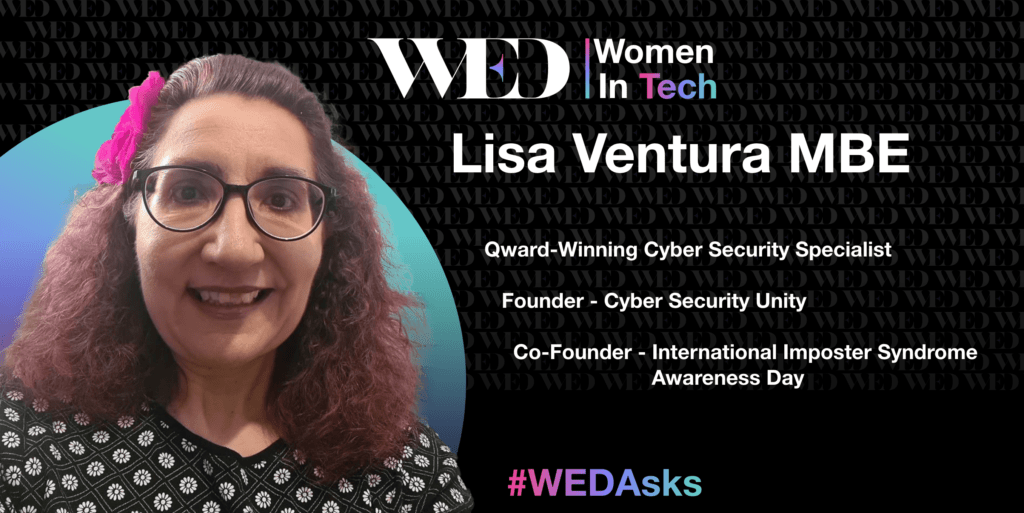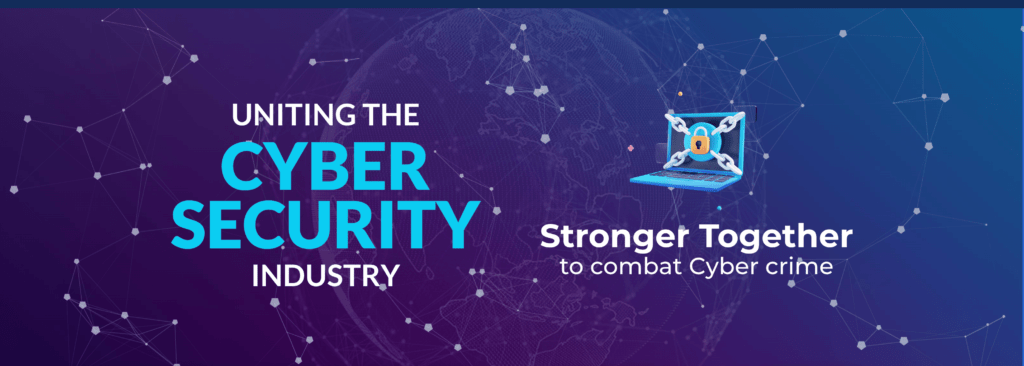
Increasing gender diversity and encouraging women into the tech sector has been a topic in the news for many years, yet women still remain largely under-represented in IT and Technology focused roles.
At Women Empowering Defence we know the importance and value of increasing diversity in the workplace and want to encourage more women into the tech industry.
Lisa Ventura MBE – Founder, Cyber Security Unity

We have interviewed Lisa to share her journey, advice and experience to help put the spotlight on women in technology with the hope to inspire more women into tech and leadership roles.
Growing up, did you know you wanted to work within cyber and technology? What was your career journey like before join this industry?
Growing up I wanted to be a journalist, but I did have a huge interest in computers and technology from a very early age. I was given my first home computer when I was 8 years old, a Texas Instruments TI-99/4A, and from that moment I was hooked. The one and only reason I didn’t pursue being a journalist when I finished my studies was that it meant moving to London, something I really didn’t want to do, as this was in the mid-1990s when email nor the internet was not in widespread use. Fate took me down a slightly different pathway though as I spent seven years working with Chris Tarrant who was the host of “Who Wants to be a Millionaire” at his management company, but as email and the internet became much more mainstream, I combined this with freelance journalism and I was published in The Times, The Telegraph and other leading publications.
In 2009 I joined Titania Ltd, a leading cyber security software development company, which is how I transitioned from the entertainment industry into cyber security and technology. I developed a huge interest in all aspects of cyber security, but I specialise in the human elements of cyber and cyber security awareness training. In 2015 I spotted a gap for a trade association that was solely dedicated to cyber security, so I founded the UK Cyber Security Association, which rebranded in 2021 as Cyber Security Unity. I wanted to create a global community in the cyber security industry for better collaboration in the industry to help with combatting the growing cyber threat and getting rid of many of the silos we often find in cyber security.

I love how technology has evolved to the point that I can work remotely from anywhere and combine my love of writing/journalism and speaking at events and webinars with what I do with Cyber Security Unity.
How did you land your current role? Was it planned?
At the time that I founded Cyber Security Unity (formerly the UK Cyber Security Association) I was undertaking cyber security awareness training consultancy work for various organisations, and I realised there was a gap for a trade association that was solely for individuals and organisations who actively work in the cyber security industry, as nothing like it existed. Some other membership bodies had cyber security as part of their remit, such as the British Computing Society for example, but there wasn’t anything that was solely dedicated to cyber security. I can see a similar gap for a trade association that is specifically for individuals and organisations that work in artificial intelligence (AI) and machine learning. The UK government has launched the UK AI Council, but there needs to be a completely independent body or trade association in this area, so watch this space!
What are you most proud of in your career, so far?
I am most proud of founding Cyber Security Unity (formerly the UK Cyber Security Association) and creating a strong community in the cyber security industry, as well as being proud of all the awareness raising, I do about the importance of cyber security and the latest threats that evolve on a daily basis. I am a born campaigner and awareness raiser; it is hard to believe looking back but in 2003 I was the Chair of the Worcester Broadband Committee which I set up to campaign and lobby BT to get the city of Worcester enabled for broadband services. I am openly neurodivergent (diagnosed with autism and ADHD) and I also undertake campaigning work to raise awareness of the huge benefits of organisations hiring those who are neurodiverse, especially in cyber security or technology roles, as well raising awareness of cyber security as a career choice for women and those from diverse backgrounds.
But the thing I am most proud of is being awarded an MBE in King Charles III’s birthday honours list in June 2023 for services to cyber security and diversity and inclusion and being presented with it by the King on Tuesday 19 December 2023 at Winsor Castle. It was the most amazing and surreal experience, and one that I am immensely proud of.
Have you ever faced insecurities and anxieties during your career, and how did you overcome them?
Oh absolutely! There isn’t a day that goes by where I am not plagued by imposter syndrome, insecurities, and anxieties during my career. I think that as someone who is neurodivergent, I feel those insecurities, anxieties, and imposter syndrome much more than those who are neurotypical, and I am often prone to periods of stress/burnout, depression and anxiety. My imposter syndrome went through the roof when I was awarded my MBE by the King!

I’ve always been fascinated by the phenomenon of imposter syndrome, so much so that I am the Co-Founder of International Imposter Syndrome Awareness Day, which takes place annually on 13 April. In terms of overcoming my imposter syndrome, insecurities, and anxieties I don’t think they are things I will ever fully overcome, so I always say that I have learnt to manage them better. One of my idols is Freddie Mercury, the lead singer of the rock band Queen, and the story goes that he was so anxious and nervous before every performance that he would often be physically sick. He would then go out on stage, but when he came off stage, he would turn to the other band members and say, “Was I alright darlings, do you think they liked me?” This from someone who had everyone in the palm of his hand during Queen’s iconic 20-minute Live Aid performance in July 1985! So, I remind myself that if Freddie could learn to manage his insecurities and anxiousness, then so could I. Another thing I do is to keep a success bullet journal, where I note down all my achievements, no matter how small they are. I can then look back on all I have done and achieved when I feel anxious or anxiety starting to creep back in and remind myself of just how much I have done and achieved.
What advice would you give other women wanting to reach their career goals in technology?
I’m often asked for advice for women who are looking to aspire to reach their career goals in technology. Some of the key things that will help include the following:
Educate Yourself: Stay updated with the latest trends and technologies in the field. Attend workshops, conferences, and online courses to enhance your skills and knowledge.
Build a Strong Foundation: Focus on building a solid foundation in the basics of technology. Understanding the fundamentals will empower you to tackle more complex challenges in the future.
Networking is Key: Attend industry events, join online forums, and connect with professionals in your field. Networking can open doors to opportunities, mentorship, and valuable insights.
Seek Mentorship: Find a mentor who can guide you through your career journey. A mentor can provide advice, share experiences, and help you navigate challenges.
Build a Diverse Skill Set: Technology is a dynamic field, and having a diverse skill set will make you more versatile. Learn both technical and soft skills to excel in various aspects of your job.
Advocate for Yourself: This is easier said than done, but don’t be afraid to speak up and advocate for your ideas. Make your achievements and contributions known, and don’t hesitate to take credit for your work.
Embrace Challenges: Be open to taking on challenging projects. Facing and overcoming challenges is a great way to grow both personally and professionally.
Create a Support System: Surround yourself with a supportive network of friends, family, and colleagues – this is crucial. Having a strong support system can help you navigate the ups and downs of your career.
Stay Resilient: The tech industry can be demanding, and setbacks are inevitable. Stay resilient in the face of challenges, learn from failures, and use them as stepping stones to future success.
Continuous Learning: Technology is ever evolving, so commit to lifelong learning. Stay curious and be proactive in seeking out new knowledge and skills.
Inspire Others: As you climb the ladder of success, inspire and mentor other women in technology. Pay it forward by helping others overcome challenges and achieve their goals.
Everyone has unique perspectives and contributions that they bring to the table which are valuable assets in the technology industry. Don’t be afraid to pursue your goals and make a lasting impact!
Is there anything that you would like to see changed in the industry?
I would like to see more support for those who are battling with stress and burnout, something that is rife in our industry, and more women and those from diverse backgrounds entering the industry. We have a huge cyber skills gap and are losing some great people from the industry due to stress and burnout. The industry also needs to be much more welcoming as it is plagued with bullies and abusers, something I have had first hand experience of. I have also experienced bullying and abuse not just from men in the industry but women too, it makes me sad as we should be lifting and building each other up, not tearing each other down. Some great progress is being made, but there is still much more to be done for true equity to be achieved.
How do you think we can achieve a more diverse future in tech?
Organisations should have a wide range of skills in cyber security and technology, which is best achieved by increased diversity. Some important ways diversity benefits a team include:
Greater Representation
Representation in cyber security is essential, especially for teams to match the diversity of those who carry out cyber-attacks and to represent the groups they are protecting. If there is a lack of diversity this can lead to gaps in cyber security training due to assumptions in end-user knowledge. If you have a range of ages in teams this results in a variety of valuable skill sets and perspectives, for example, cyber security professionals with long-term experience will have much more experience with malware, whereas those who are younger will be more versed in modern threats.
Variety of Perspectives
If you have people on your team from diverse backgrounds this will bring a variety of viewpoints, which means teams are more likely to get past obstacles and efficiently resolve issues by approaching them from different angles and viewpoints. Different questions may also be asked, and this level of diversity means teams are likely to have more options available to them and find better solutions.
Greater Problem Solving
A diverse team will often provide more than just a range of different perspectives. When you are surrounded by peers who are more diverse, the members in the majority group may start to question their own assumptions, in turn helping them to improve their problem-solving capabilities. Visual diversity in teams often helps those involved to handle conflict in a more constructive way and in anticipation of potential conflicts are more likely to undertake more due diligence and research before presenting ideas, leading them to discover more problems on their own.
How to Increase Diversity
Increasing diversity can bring great benefits to organisations, but it does mean changing perceptions and examining any biases you might have. Some of the ways you can increase diversity in your organisation include:
Focus on Staff Retention as much as Staff Recruitment
Studies show that up to 52% of women leave security careers, as do those with non-traditional backgrounds, and this is nearly double the percentage of men who leave cybersecurity careers. Some say this is because women don’t enjoy their careers in security, but 80%+ of women in the industry say that they love their work. This implies that many from diverse backgrounds leave the industry due to culture.
Keep Your Conscious and Unconscious Biases in Check
Too often, we have a mental picture of what a security person is supposed to look like which does not reflect reality. Appearances can be very deceptive, so acknowledge that your biases may not be explicit or intentional and learn to recognize that they do exist. Listen to what people say, evaluate the work they produce and observe how they collaborate with others – these are all indicators of the value they bring to the organisation.
Nurture Those who Think Uniquely
Building a culture of inclusion where everyone has a chance to share their ideas can help hugely when it comes to improving diversity within security organizations. Not every idea will be a great one, but all ideas and opinions should be shared and listened to.
Increase Your Talent Pool Through Flexible Working
Supporting flexible working hours, a flexible working location, job sharing or three weeks on/one week off enables people to set their own hours and location where they feel at their most productive, while still delivering on deadlines and projects. Trust that people can be productive even if they don’t work in the same way or at the same time as others.





Responses